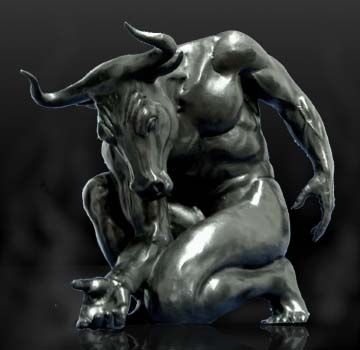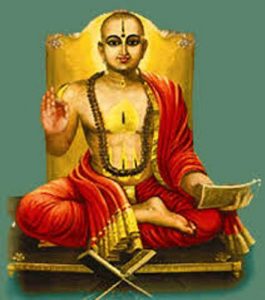When people talk about the ancient mythological creature Minotaur, a ferocious beast immediately comes to mind and perhaps the infamous myth of the labyrinth as well. What people may not know, though, are the interesting details of the events that lead up to the birth of the mighty Minotaur. What is universally recognized as a feared creature of unusual birth was actually created from unfortunate actions between a selfish king and a vengeful god.
King Minos and his wife Queen Pasiphae led a good life ruling over the island of Crete. Minos held power over multiple islands of Greece and was recognized for his success and power by many. In an attempt to prove his rightful claim as King of Crete, Minos had sworn to locate the best bull he could find among his cattle, one that would be very favorable to its intended receiver. Minos would then take this great bull and sacrifice it to Poseidon, god of the seas, as he did each year in order to secure his ownership of the throne. One year in particular, among King Minos’ herd, there birthed a magnificent bull, one that possessed a unique kind of beauty that King Minos had never seen before. Minos truly was in awe of this magnificent bull, so much so that he found himself captivated by its beauty, and he realized that this bull was something he did not want to give up to the promised Poseidon. In fact, Minos purposefully chose to overlook the magnificent bull when making his decision, and settled on a less attractive bull to sacrifice to Poseidon.1

Watching him and his deceitful actions very closely, Poseidon took notice of King Minos’ plan in sacrificing a lesser bull to keep the best for himself. This made Poseidon very angry, and he immediately began thinking about how to discipline Minos for his selfishness. Poseidon saw that Minos loved his wife Pasiphae immensely, and with this knowledge, constructed a plan that would leave Minos and Pasiphae in the presence of a monster. 2
Poseidon cast a curse upon Queen Pasiphae, one of love, which she could not escape. Her love was not for her husband; instead, she felt love for his magnificent bull. Pasiphae would be found swooning over the magnificent bull as if it were a handsome and powerful man ready to take her into his strong arms. Alas, she was so utterly infatuated with the magnificent bull that she constructed a plan to lure the bull towards her, and hopefully lay with her romantically.3
Queen Pasiphae instructed a craftsman of the island, Daedalus, and his son, Icarus, to build her a wooden structure that represented a near-perfect body form of a female bull. She insisted that the piece be built as realistically as possible and large enough for herself to comfortably fit inside without revealing that she was human. In spite of her odd orders, Daedalus and Icarus did what the Queen asked of them. As a finishing touch, Queen Pasiphae placed a large cow hide over the structure so that the magnificent bull would notice the structure and take it as a female looking to mate. The Queen rolled the structure out to the field where she would often see the magnificent bull grazing day after day. She strategically placed herself in the view of the magnificent bull, stepped inside the structure, and waited patiently for the bull’s approach.4

After grazing for a bit, the magnificent bull caught sight of what it thought was the beautiful female and approached it. Before long, the Queen’s plan worked, as the magnificent bull fastened itself upon her and together, engaged in sexual and intimate relations. As a result of this, Queen Pasiphae became pregnant with the baby of the bull and upon its birth realized she was carrying something horrific inside of her.5
Just as Poseidon intended, Pasiphae had relations with the bull she loved and later birthed an unusual creature, born half-bull, half-human to be known as the Minotaur.

The creation and birth of the Minotaur, as well as other monsters, typically is done in response to acts of sin. In this particular case, King Minos’ egotistical actions led him to break a promise made to a god, and in return, that god made Minos’ wife feel the same love that her husband did for the magnificent bull, giving in to her abnormal fascination and eventually birthing an infamous monster of ancient Greece.6
- UXL Encyclopedia of World Mythology, 2009, s.v. “Minotaur.” ↵
- UXL Encyclopedia of World Mythology, 2009, s.v. “Minotaur.” ↵
- Christian Moevs, “Centaurs, Spiders and Saints,” in Vertical Readings in Dante’s Comedy: Volume 2, edited by Corbett George and Webb Heather (Cambridge, UK: Open Book Publishers, 2016), 14-17. http://www.jstor.org/stable/j.ctt1sq5vb5.7. ↵
- UXL Encyclopedia of World Mythology, 2009, s.v. “Minotaur.” ↵
- Christian Moevs, “Centaurs, Spiders and Saints,” in Vertical Readings in Dante’s Comedy: Volume 2, edited by Corbett George and Webb Heather (Cambridge, UK: Open Book Publishers, 2016), 14-17. http://www.jstor.org/stable/j.ctt1sq5vb5.7. ↵
- George Palmer Garrett, “The Function of the Pasiphae Myth in Brother to Dragons,” Modern Language Notes 74, no. 4 (1959): 311-13. doi:10.2307/3040070. ↵



134 comments
Joshua Castro
Growing up I have always been extremely fascinated by Greek myths. Despite this interest, I was never aware of how the Minotaur came to be. It’s funny to see how the recurring theme within Greek myth has to do with someone who believes they’re as powerful as or can trick the gods into something that they won’t benefit from. This was an overall fascinating and very detailed article explaining the origin of one the most well known mythical beasts of history.
Alyssa Childs
I enjoy reading Mythological stories and this among others is very strange. I find it a little gross that a woman would go so far to induce a bull into having a sexual relationship with her. It is unbelievable that she would give birth to a half bull/human baby, but that’s what you get when reading stories of mythology. It is sad to know that people feared this newborn because this newborn had no voice of how it wanted to be born, but when someone sins they get what they deserve.
Bryan Martin Patino
I have read many Greek Myths as they are very intriguing and I love learning about how people would interact with gods. It is always amazing to discover that there is always one or two humans that believe they are better then the god or that they could simply out wit an all powerful being. this article was very interesting as it made bestiality seem not as disgusting as it really is. I enjoyed the article and thought it depicted story pretty well from the other readings i have read on my own.
Alexandra Lopez
I absolutely enjoy reading Greek Mythology. I’m more familiar with the Greek Gods than the mystical creatures and such. I had never read up on the creation of the Minotaur until now. It’s incredibly shocking to actually read about an abnormal infatuation fueled by selfishness from King Minos. From reading about Greek Mythology, I have always known that the Minotaur was an act of sin but never expected Queen Pasiphae to actually act on her infatuation with the bull. This article does a fantastic job on telling the story of the Minotaur.
Derek Esquivel
Greek mythology has always been interesting to me because I have always loved how these stories are being told of these gods that came to be and that the Greeks used to worship. Reading this article about the Minotaur was extremely interesting because of me personally have never read about the creation of the Minotaur but have always read many stories of this monster in many other Greek writings. It is astonishing to also know how most creatures are made because sin is being taken place and revenge is what fuels these creatures.
Christopher King
I enjoyed this article because although it is not a piece of history, it is a part of their culture and the way they believed in things. For their religion it was not based off of sins but mostly just trying to not piss off the Gods. They believed if they did awful things such as the Minotaur for example, would happen and destroy their lives.
Cheyanne Redman
Prior to the article, I had little knowledge of the minotaur, yet I find Greek Mythology so interesting and entertaining. The author did such a good job with keeping the reader hooked, while showing pictures to provide scenery. I enjoyed how well the story was written, and how it showed the origin of the Minotaur itself from infidelity. The minotaur is seen as an act of sin, and I feel the author did a good job with explaining the whole entire story in complete detail.
Jose Figueroa
The story of the minotaur has always been one of my favorite myths. Despite this, I never would have imagined how the minotaur had actually came about: sexual relations with a bull! Queen Pasiphae plan to lay with a bull was quite odd as well as King Minos infatuation with the bull. I guess for Poseidon the only revenge was to take an eye for an eye and make Minos feel like Poseidon did. A very fun read!
Natalia Flores
I’ve always been a fan of Greek mythology, but I’ve only heard that Queen Pasiphae gave birth to the Minotaur. It’s interesting to hear more about the birth of the Minotaur and to hear more about the Minotaur’s father and how the bull infatuated both King Minos and Queen Pasiphae. Though the story is bizarre and strange, it is still fascinating and helps to connect the other myths.
Evian-loren Salgado
This was a very well written article about the origins of the Minotaur. Previously I was unaware of the origin of the minotaur in detail. I did however know of other stories like Theseus and the Minotaur. Overall This article was very informative and very interesting to read about. Greek Mythology has always been very interesting and I think the author did very well in keeping the readers attention.